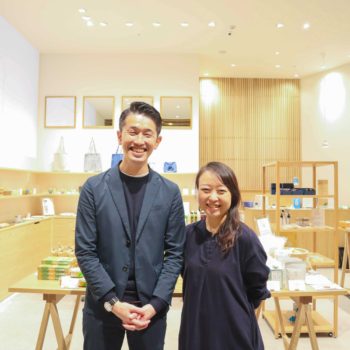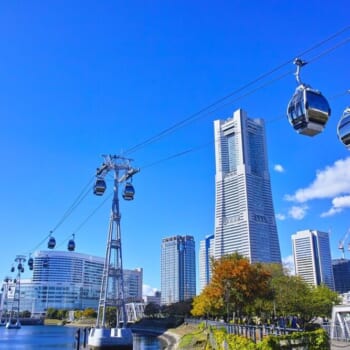![How can we make a business more sustainable? Find out the way with haishop [Experience Report]](https://circular.yokohama/wp-content/uploads/2021/05/Image-from-iOS-48.jpg)
How can we make a business more sustainable? Find out the way with haishop [Experience Report]
- On 2021/12/22
On Saturday, March 6, 2021, we held an idea-thon with Hideaki Omote and Nao Wada from Innovation Design, Inc. They run a sustainable souvenir shop and cafe, “haishop,” in Bashamichi, Yokohama. This idea-thon is to solve issues through running circular businesses and local services.
The main topic was “Circular Economy and Startups.” We shared the critical perspective of running a business sustainable along with the concept of the circular economy.
*This event is part of Circular Economy Plus School, which is organized by Circular Yokohama in collaboration with the YOKOHAMA Living Lab Support Office and the NPO Yokohama Community Design Lab.
The main idea of the idea-thon
In the idea-thon this time, we had 11 participants and divided them into several groups. Each group examines the issues haishop currently faces through discussion; following the steps below:
- Identify the issues
- Clarify the advantage of the people, things, location, and spaces haishop has
- Come up with solutions
- Brush up and summarize the ideas
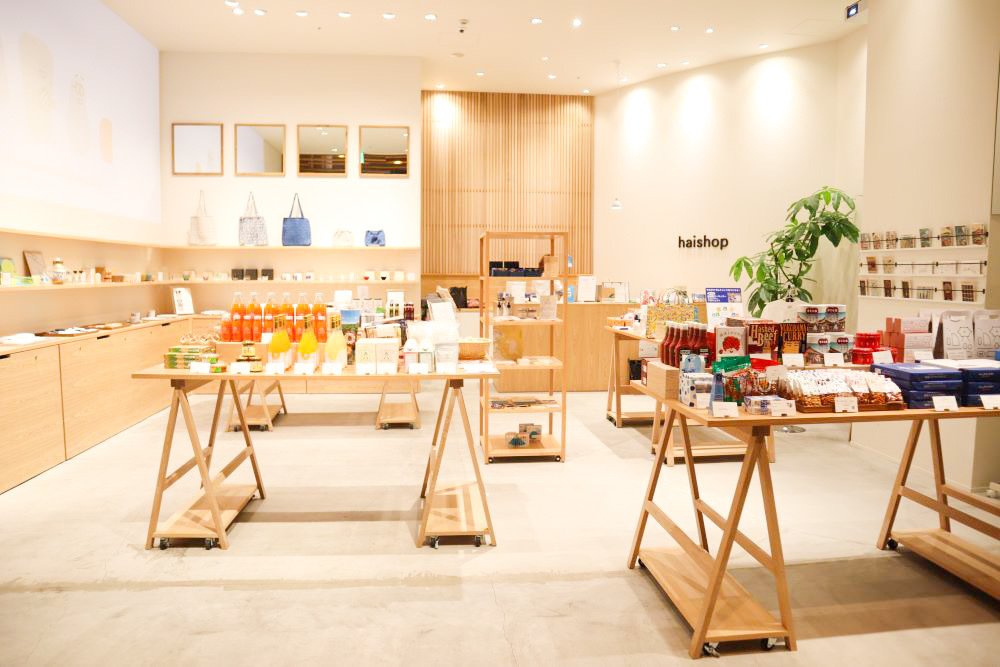
haishop at Bashamichi, Yokohama
Identify the issues
haishop aims to solve social problems through their souvenir shop. Many of their merchandise is made in Japan and has unique backgrounds and messages that help solve social problems.
Mr. Omote and Ms. Wada firstly introduced their current activities. Then brought up some of their challenges in running an environmentally and socially friendly business:
-We want to make their store 100% plastic-free, but many products come with plastic packaging.
-Telling each product’s story is our commission, but the number of customers visiting our store decreases due to the COVID-19. It is hard to communicate with customers directly.
-We have opened our online stores, but it is even harder to communicate with customers online than to do so face to face.
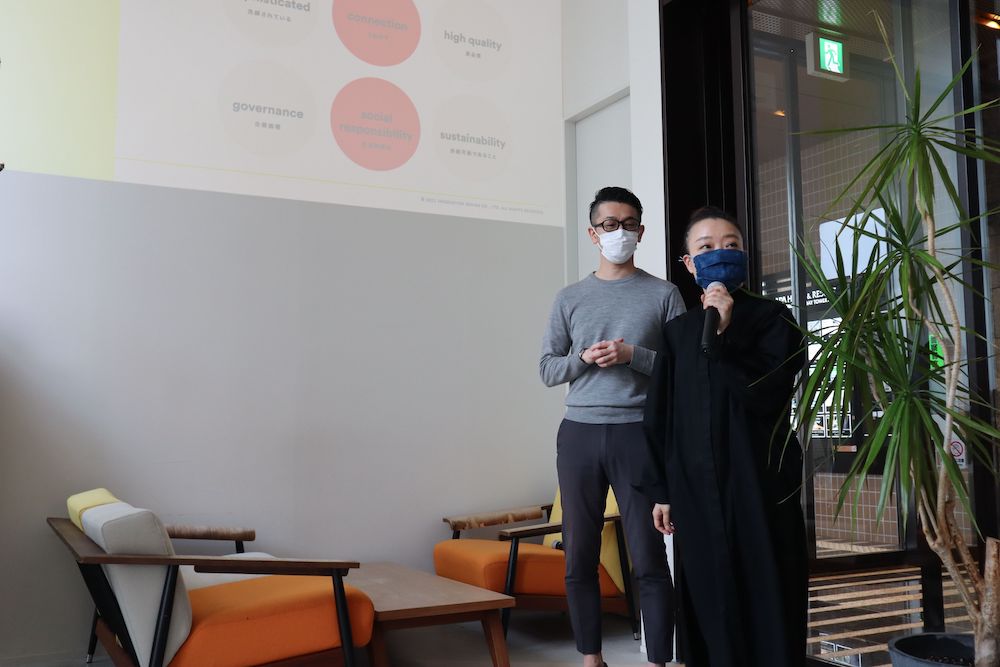
Mr. Omote (left) and Ms. Wada (right)
Clarify the advantage of the people, things, places, and spaces haishop has
The way to reduce environmental impact has been discussed in realizing a circular economy. To achieve that, one of the critical factors is to know what we already have, other than what we do not. In other words, maximizing the value of the existing assets and adding them new roles and importance rather than mining limited resources and producing brand new things.
On this concept, each group clarified the assets that haishop has and wrote them down on post-its.
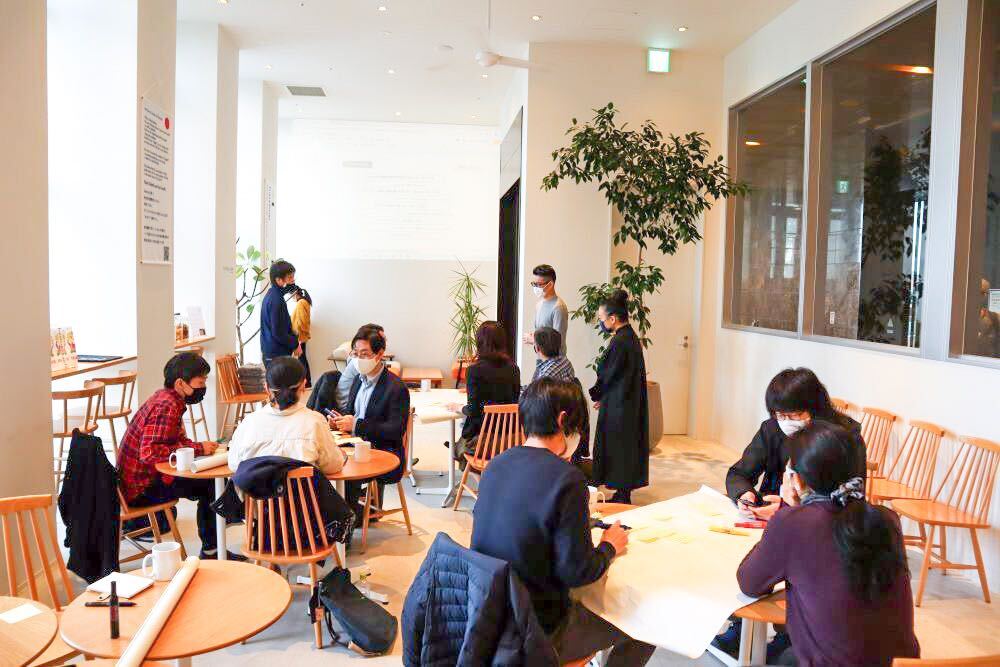
Participants listed up various assets that haishop has:
-the APA Hotel (where haishop is located)
-the nearest station, Sakuragicho (One of the principal stations in Yokohama)
-connection with the producers of the products
A lot more ideas related to the people (skills and knowledge), things (facilities, equipment, products), places and spaces (haishop, cafe, web), and information are found as the assets and resources haishop already has.
Come up with solutions
After clarifying the existing assets, we hybridized them and created new ideas. The vital thing in this step was to verbalize and share the thoughts as much as possible. The point of doing an idea-thon is to accept each other’s ideas, expand them, arrange them, and try to think in all directions.
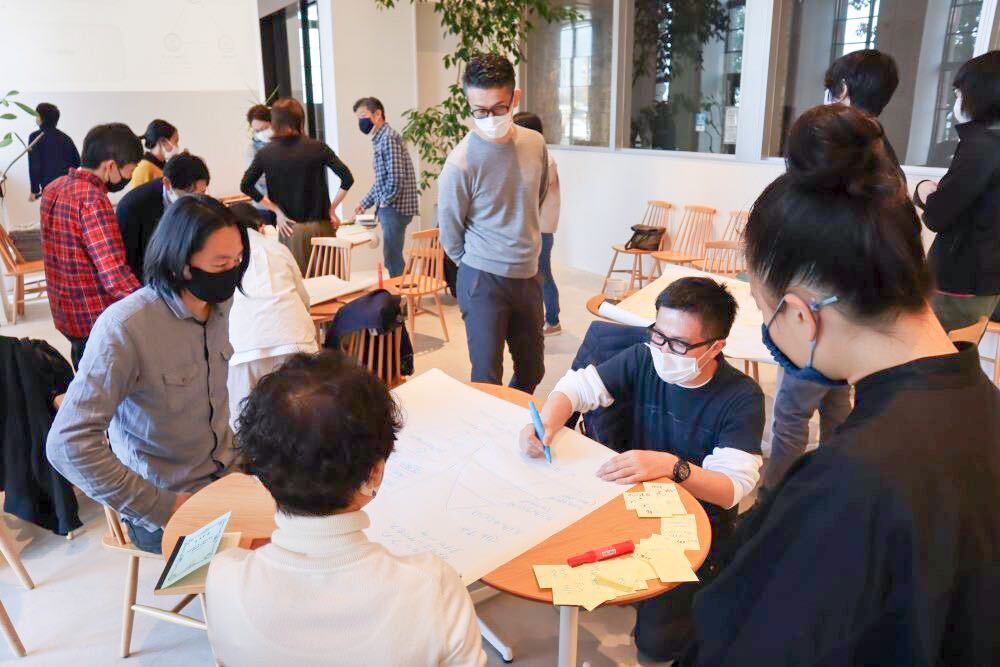
Brush up and summarize the ideas
After coming up with all the ideas and thoughts, we converged on them.
This time, to summarize the idea-thon, we followed the triple bottom line concept (known as TBL), an essential framework for sustainable corporate management.
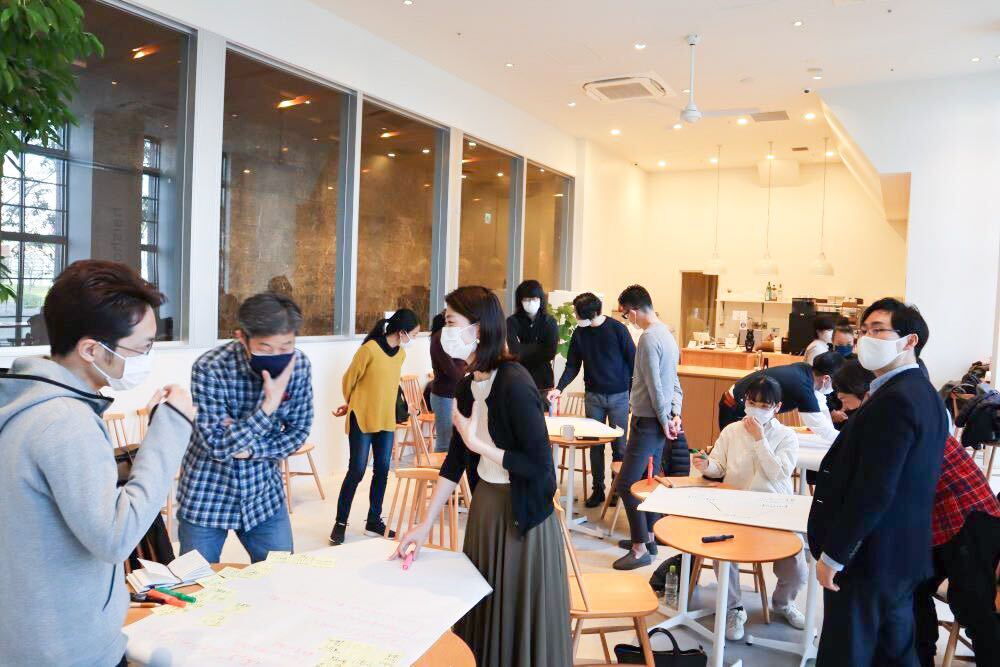
We evaluated if each idea considered economical, environmental, and social axes, which TBL defines as the critical perspective. If they lacked any of the perspective, they added complementary elements and fit them into the concept.
Presentation
Finally, each group summarized their ideas on a paper and presented them to Mr. Omote and Ms. Wada.
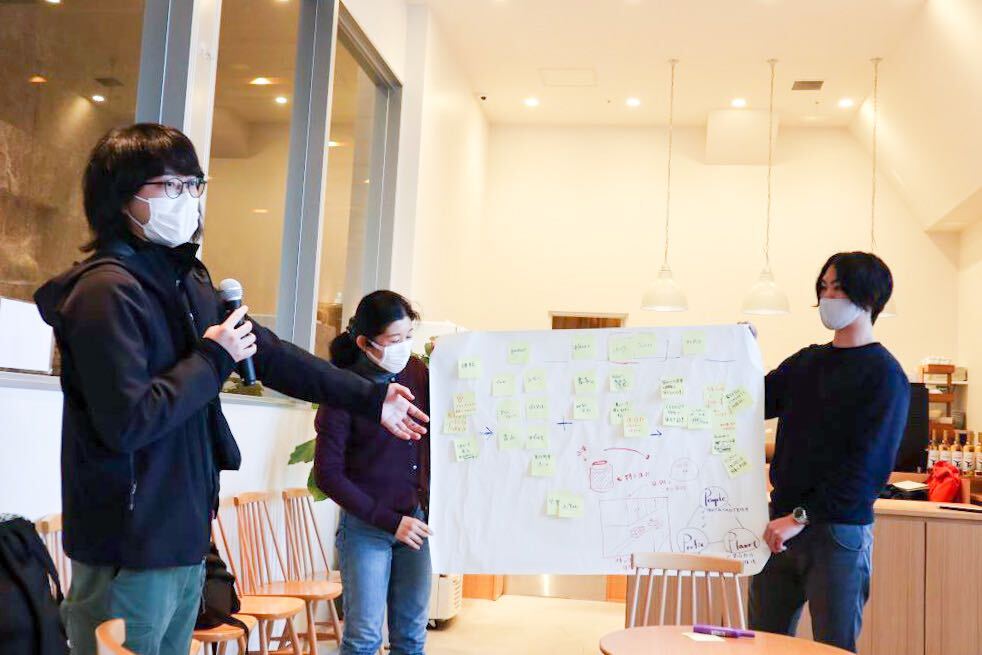
The ideas presented by the participants were following:
“Offer customers to earn points with every purchase through the haishop online store to visualize how much actions they took for reducing CO2 emissions through their investment with haishop.”
“Ask customers for the unique packaging design. Customers would possibly like to share it on their social media, which would be a good promotion for haishop.”
“Create a storyboard and offer a subscription service that makes people feel like traveling.”
After the presentations, Mr. Omote and Ms. Wada wrapped up the idea-thon with the comment that “it was such a valuable time to get many objective ideas from the sustainable perspective. We will incorporate those ideas into our future management, so please continue to watch over haishop.”
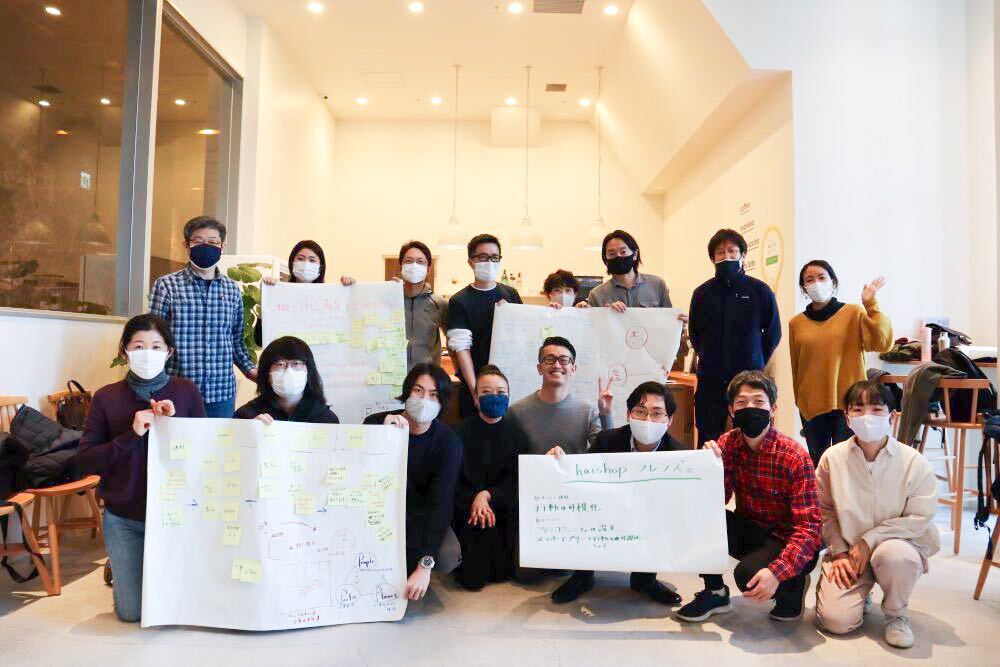
Editor’s note
How can sustainable business development be achieved? There is no entirely correct answer to this question. The important thing is to work with all stakeholders and keep seeking the benefits for everyone involved in your business. I believe that we can realize sustainable business management over pursuing that way.
haishop is holding many events such as a vegetable market, a social film festival at its cafe other than selling souvenirs. We hope that this idea-thon will help them solve the issues and their business will be more sustainable.
We’ll keep an eye on their efforts in the future!
[Related posts]Sustainable Vegan Ramen made with Yokohama local produce
[Reference]How haishop is turning Japan’s souvenir culture into a force for good
Circular Yokohama Editorial Team
Latest posts by Circular Yokohama Editorial Team (see all)
- YOKOHAMA CIRCULAR FASHION GATHERING: Envisioning the future of textile circulation across industries [EVENT REPORT] - 2025/12/9
- Harch Inc. is Holding the Release Event for “Sustainable City Guide: TOKYO – Connect with brands and enjoy upcycling! - 2024/8/7
- Basic and collaboration agreements finalized for Yokohama SDGs Design Center Project - 2024/6/21


![Think about the future of Yokohama with Donut Economics [Experience Report]](https://circular.yokohama/wp-content/uploads/2021/06/Image-from-iOS-64-300x235.jpg)
![Can DX be a solution to the problem with plastic containers? [Experience Report]](https://circular.yokohama/wp-content/uploads/2021/05/shutterstock_525066214-300x200.jpg)
![What post-COVID-19 world look like? Circular Economy Plus clear up the new demands in Ryokuen [Experience Report]](https://circular.yokohama/wp-content/uploads/2021/05/FBxDJiOA-300x200.jpeg)
![Yokohama local plastic waste turns out to be a unique asset [Experience Report]](https://circular.yokohama/wp-content/uploads/2021/05/159009092_4137153702984581_8946275429530827838_n-300x200.jpeg)
